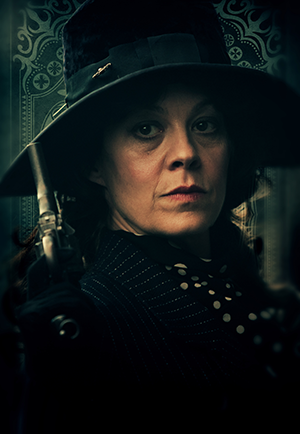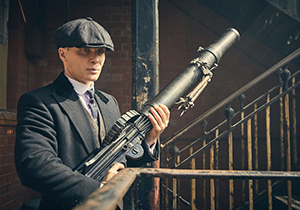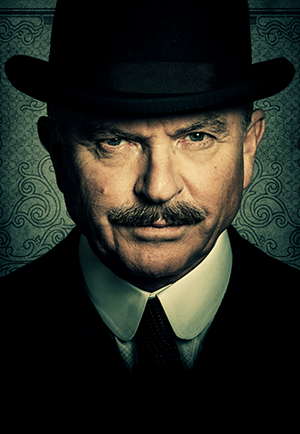The Irish in Peaky Blinders (Series 1–4)
Published in Issue 3 (May/June 2018), Reviews, Volume 26BBC2, RTÉ2, 2013–17
By Brian Hanley

Above: The family’s Aunt Poll (Helen McCrory), who ran the business during the war—one of several strong female characters.
Above: The family’s Aunt Poll (Helen McCrory), who ran the business during the war—one of several strong female characters.
(All images: BBC)

Above: Thomas Shelby (Cillian Murphy) toting a Lewis machine-gun, part of the consignment of weapons that the Blinders stole from the local BSA factory and which the authorities feared would fall into the hands of communists or the IRA. In fact, the IRA did try to steal weapons from Birmingham’s BSA factory.

Above: RIC Chief Inspector Chester Campbell (Sam Neill) is dispatched from Belfast, bringing both a unit of Ulster Volunteers and a fearsome reputation.
But it is the show’s treatment of the politics of post-war Britain that marks it out as more than just another gangster drama. The first episode of the series opened with communist Freddie Thorne addressing a factory meeting. Strikes and lockouts and the influence of the Bolshevik revolution are a recurring theme. Ada Shelby (Sophie Rundle) becomes a communist; she and Thorne name their son ‘Karl’. In the fourth series Charlie Murphy plays shop steward Jessie Eden (based on a contemporary left-wing activist of the same name). Rarely (in recent years at least) has class struggle formed such a backdrop to a mainstream television show. There is also a significant Irish dimension to the story-lines. In the first series the Blinders had accidentally stolen a large consignment of weapons from the BSA factory, which the authorities fear will end up in the hands of either the IRA or the communists. In response, RIC Chief Inspector Chester Campbell (Sam Neill) is dispatched from Belfast, bringing both a unit of Ulster Volunteers and a fearsome reputation; ‘Catholic men who crossed him used to disappear in the night’. As Winston Churchill (Andy Nyman) warns Campbell, however, different rules apply in Birmingham: ‘This is England, not Belfast; bodies thrown in the rivers wash up in the papers here’. Instead, he is advised ‘if there are bodies to be buried, dig holes, and dig them deep’. As part of his plan to combat the twin threat of the IRA and communism, Campbell employs ‘Grace Burgess’ (Annabelle Wallis) as a spy. Her family are also war veterans, cavalrymen proud of their service in the forces, and her father a policeman shot dead by the Belfast IRA. The Blinders are criminals, not political activists, as Arthur Shelby (Paul Anderson) protests: ‘We’re patriots … we’ve no truck with Fenians or communists’. But as they are drawn deeper into the war between the British state and its enemies, they try to play both sides. Tommy Shelby carries out a killing for the IRA and supplies information on subversives to Churchill. Subsequent series have introduced Italian and Jewish mobsters, the Bolsheviks themselves, White Russian emigrés and right-wing employers’ organisations.
The series fulfils its primary function in being entertaining, but does it have any value as popular history? In fact, many of the series’ themes echo the contemporary fears expressed by those such as Sir Henry Wilson who worried that the ‘Irish question’, if connected to domestic radicalism, would destabilise British society itself. Post-war Britain also experienced a moral panic about the involvement of brutalised war veterans and immigrant gangs in crime. And Irish republicans were very active in Britain between 1916 and the end of the Civil War. IRA HQ ran a sophisticated smuggling network from Europe and North America, much of it funnelled through the port of Liverpool. In Britain itself, units operated in all the major centres of Irish population. Short of adequate weaponry, many local battalions in Ireland sought arms independently, often using emigrant networks. Ex-servicemen were a regular source of supply, as were some British radicals, but there are tantalising hints in the Bureau of Military History and Military Service Pension files of republican interaction with the English underworld as well. IRA members traded with gangs in London’s East End, Birmingham, Sheffield and Newcastle. They bought guns from Chinese and African sailors and sought the assistance of Jewish and Italian criminals. They did in fact try to steal weapons from Birmingham’s BSA factory. Some of their operations would not have been possible without local knowledge, as one Irishman based in that city recounted, noting that, while the ‘underworld … was a great source of “stuff”’, he needed an interlocutor to deal with it, as, among other things, ‘the language of the “Brumigumites” is not just Oxford English’. (A frequent criticism of Peaky Blinders is that many of the actors have failed to master the local accent.) There was double-dealing and confusion, money and weapons went missing, and there remained suspicions about the IRA operations in Britain that lasted for years afterwards. Many of the actual events would not be out of place in the Peaky Blinders story-line. In many ways the show succeeds in capturing the spirit of those times better than a more self-consciously ‘factual’ series.
Brian Hanley is a Research Fellow in Irish History at the University of Edinburgh.
















